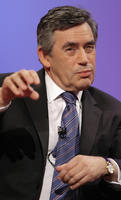 What is most remarkable about the descent of Gordon Brown is that the voters have never even hinted at giving him a second chance. Ever since the debacle of the election that never was Brown and Labour’s ratings have moved downwards at a pretty rapid clip. We are now at a point where 74 percent of voters think he is a change for the worse from Blair and the Labour party is in some danger of being overtaken by the Liberal Democrats in the polls.
What is most remarkable about the descent of Gordon Brown is that the voters have never even hinted at giving him a second chance. Ever since the debacle of the election that never was Brown and Labour’s ratings have moved downwards at a pretty rapid clip. We are now at a point where 74 percent of voters think he is a change for the worse from Blair and the Labour party is in some danger of being overtaken by the Liberal Democrats in the polls.
There is one very simple, overlooked reason why Prime Minister Brown hasn’t been given a second chance: he’s never asked for one. In his interview with Andrew Marr after cancelling the election or after the May Day elections where Labour recorded its worst local election results for 40 years and lost London, Brown could have said sorry and asked the public to give him another go. Instead, he has stuck stubbornly by Disraeli’s dictum: never apologise, never explain. Indeed, the only people he said sorry to in either interview were the Labour councillors who lost their seats in the local elections.
Imagine how different things might have been if in that Marr interview, Brown had said:
“Andrew, we did all get rather carried out with this idea of an early election. We were distracted by all this talk of massive poll leads and I apologise to the British public for that. I have decided against an election and it is now time for all of us in the Cabinet and the Labour party to refocus on what we were sent here to do by the Great British public: make this a stronger and fairer country. I’ll be back at my desk on Monday doing what we do best, governing for the good of the many not the few.”
Now, to be sure, Brown would still have taken a hit. But a statement like this would have helped minimise the damage.
Even after the May 1st elections, Brown had an opportunity to try and persuade the public that he was worthy of a second chance. On the Monday afterwards he could have called the main news anchors to Downing Street and given each an interview in which he explained that he had tried to run the government as he had the Treasury and it had not worked. He could have said that he knew that, he accepted that and he would now be governing in a very different style. The central message should have been:
“I have given of my best, but the British people have not seen my best. I have listened and learned and I pledge that you will now see my best. I ask you to judge me on that pledge at the next election.”
This might not have worked or have been too little, too late but it would at the very least have prepared the ground for a Brown comeback narrative. By showing contrition and vulnerability he would have eased some of the public hostility towards him, almost one in four voters give Brown 1 out of 10 when asked to rate him, and maybe even generated some sympathy and another look from some voters.
My hunch is that it is now too late for Brown to throw himself at the voters’ mercy. The public image of him as a stubborn man who refuses to admit error is probably now too firmly fixed in the public mind to be dislodged by an interview or two. Sorry might be the hardest word for Brown but it is this attitude that has left his political standing in such a sorry state as the first year of his premiership draws to a close.







Comments